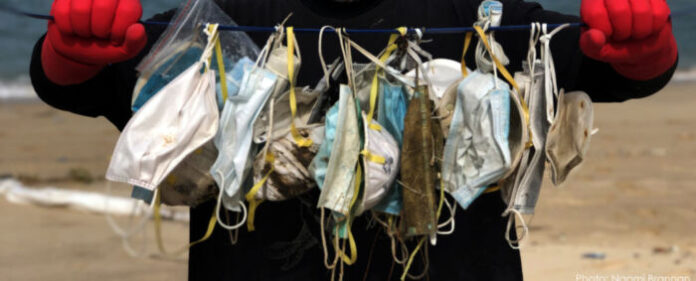
Researchers have begun to see a spike in the number of discarded surgical masks washing up on Hong Kong beaches since the COVID-19 pandemic began at the end of 2019. Saanich researcher Teale Phelps Bondaroff works as the director of OceansAsia – a non-profit organization focused on marine issues including organized crime involving sea creatures. Over the past few weeks, researchers have been noticing large numbers of surgical masks washing up on the Soko Islands – a group of islands off the coast of Hong Kong.
Gary Stokes, OceanAsia’s Founder, told Energy Live News: “We have found 70 discarded masks within 100 metres of the beach and an additional 30 masks when we returned a week later. Over time the team has seen the odd mask here and now, however this time they were all along the high tide line and foreshore with new arrivals coming in on the current. When you suddenly have a population of seven million people wearing one to two masks per day the amount of trash generated is going to be substantial. The masks were not that old, some almost looked brand new meaning they were not in the water long”.
Teale Phelps Bondaroff, Director of Research at OceansAsia, told Energy Live News: “A mask that is ingested by a local turtle, pink dolphin or finless porpoise, for example, could easily become stuck in the digestive system of this animal, thereby killing it.
The increased number of discarded masks on the beaches “underscores the weaknesses in the waste management supply chain,” Phelps Bondaroff said. He also sees this as an opportunity to remind people to follow advice from health officials for proper mask disposal so masks don’t start piling up on beaches in other parts of the world.
“Most of these masks contain or are made of polypropylene, which does not break down quickly. Marine plastic pollution is a serious problem. It is estimated that every year, over eight million tonnes of plastic enter our oceans. This plastic does not disappear but rather slowly breaks down into micro-plastic, which enters food chains, with devastating effect. Estimates suggest that more than 100,000 marine mammals and turtles and over a million sea birds are killed by marine plastic annually. Marine plastic adsorbs toxins, which results in it poisoning animals that accidentally ingest it”.
Photo by oceanasia.org



































